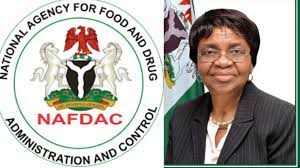By Hassan Zaggi
The Director General of the National Agency for Food and Drug Administration and Control (NAFDAC), Prof. Mojisola Adeyeye, has disclosed that the agency will experience unprecedented transformation and also fight fake, spurious and substandard products to a standstill in the country in her second tenure.
It would be recalled that the NAFDAC Director General was recently reappointed by President Muhammadu Buhari to serve for a second term of five years.
Speaking at a media briefing to announce her agenda for the next five years, in Abuja, yesterday, she said that despite the numerous achievements recorded in the last five years, the COVID-19 pandemic badly affected the earlier planned of the agency.
Among other things, the NAFDAC Director General revealed that she has concluded plans to construct a befitting headquarters for the agency in Abuja, the Federal Capital Territory in the next few years.
She stressed that infrastructural development will receive due attention in her second term.
According to her, the building of a new befitting headquarters in Abuja is part of the continuation of nation-wide improvement of working environment including having additional laboratories, zonal and state office infrastructures.
NAFDAC staff, according to her, deserve befitting offices so that they can have a good working environment to be productive. She further revealed that the agency will increase its staff strength by 100 per cent in the next few years.
Prof. Adeyeye also said that the agency will create an office that is dedicated to take care of women’s health.
The new office for women’s health, she said, will be saddled with the responsibility of understudying drug, cosmetics, and food products that affect women, the unborn and the child.
The new office, she further explained, will “emphasize misuse or abuse of drug among women and impact on the child and more focus on maternal and child mortality and morbidity rate.”
Speaking on other new initiatives, Prof. Adeyeye said that Supply Chain Monitoring will be given renewed attention.
According to her, there will be continual sanitization of the Supply Chain Units to mitigate counterfeits and substandard foods.
The agency will also, “scale up Track and Trace of Imported and locally manufactured pharmaceuticals; establish Structured and Active Tracking and Tracing through Solution Providers and initiate Track and Trace of Foods.”
She further noted that there will be continual vigilance to reduce substandard foods, counterfeit medicines, and narcotics.
The next few days, she revealed, will witness enhanced Local Manufacturing (including Vaccines) Quality and Trade; training on Active Pharmaceutical Ingredients (API) Regulation; develop NAFDAC-Industry API Manufacturing Regulation and enhance Research and Development Training Platforms with the pharmaceutical industry.
In an effort to expand Post Marketing Surveillance (PMS), she noted, the agency will recruit more staff and provide more tools; provide capacity building and make enforcement nimbler for sustained response.
While lamenting that the agency is grossly understaffed, Prof. Adeyeye revealed that one of her plans is to increase the staff strength by 100 per cent in the next few years.
“We need staff. In one of our states, we have only 12 staff and they are expected to do a lot of things in the state. They are supposed to do surveillance, inspection, follow up, registration and many others.
“So, part of what I want to achieve is to increase our staff capacity by 100 percent. We are currently about 2000 now, but by the end of year 2024, 2025 or thereabout, we would have reached 4000. Because that is part of our post marketing surveillance. We are going to improve on that with the little that we have but we are praying that the government will bail us out with funding.”
Responding to a question on the proliferation of sachet and bottle water manufacturers, she said: “Water kills so fast compared to food because it absorbed so fast, especially in children. Their body is so small, whatever enters their body can damage quickly. I am very interested in the quality of water our people drink. We are going to intensify efforts on that and partner with the media to ensure we get the needed sensitization done.”
She further revealed that her second term will witness continuous strengthening of regulatory activities through creative engagement of Micro, Small and Medium Enterprises (MSMEs).
She noted that there will more proactive interaction with different sectors of MSMEs at the state level; better engagement on exportation of regulated products; establish evidenced-based facilitation of export of quality NAFDAC regulated products and expand the role of the NAFDAC Office of Trade and International Relations.
She noted that there will continuation of improvement in ICT functions of the agency through enhance digitalization of more regulatory processes for better management and transparency and also improve the website for better navigation.
Further explaining what she described as strategic goal for the next 5 years, Prof. Adeyeye said that she is targeting at attaining WHO ML4 and World Listed Authority (WLA) Status in the next few months.
Attainment of the Level 4, she explained, will enable global trade of Nigerian-made pharmaceuticals through collaborative registration with other regulatory agencies and local Pharma manufacturers to be more competitive in Africa Continental Trade Agreement (AfCTA).
Another area of interest, she said, is attaining Vaccine Lot Release ML4, which reiterated will position Nigeria strategically for vaccine manufacturing.
The agency will “ensures Good Manufacturing Practice of Nigeria Vaccine Company; assures quality, safety and efficacy of vaccines manufactured in Nigeria or imported and establishes Vaccine Clinical Trial Research and Service Pipeline for the Local Manufacturer” she said.
On governance and finance, the NAFDAC Director General said that the agency will continue meaningful deployment of human capital; sustain strong governance – expansion of Directorates for greater and impactful management; obtain approval of Hazard and Regulatory Allowance (To be funded from NAFDAC Generated User Fees) and secure approval of Scheme and Condition of Service.
She further noted that the agency will sustain strong financial management by ensuring staff are well-trainned on SAP accounting software; increase IGR and User Fees by 20% from the current levels based on availability of more infrastructure and tools stated and more accountability.
While recalling the achievements she recorded in the past 5 years despite the huge negative effect of COVID-19, Prof. Adeyeye said that the efforts of the agency led to its attainment of World Health Organisation (WHO) Maturity Level 3.
The attainment, she said, made Nigeria to be recognized as one the 6 African countries that can manufacture vaccines.
She revealed that the agency recorded huge progress in the past 5 years in the area of herbal medicines and medical device regulation.
According to her, in the past five years, the agency was able to develop new guidance and guidelines; new technical information submission template; inaugurated herbal medicine product committee; organized many stakeholders/practitioners/researchers’ meetings and paired and mediated practitioners/researchers’ collaboration.
Other achievements in the area of herbal medicine, she said, included the registration of more than 40 COVID-19 related herbal medicinal products during the pandemic and the registration of the first Nigerian-made medical mask during the pandemic, and was exported/sold in the USA.
According to Prof. Adeyeye, in the past 5 years, the agency was able to strengthen local pharmaceutical industry through regulatory policies or mediation with the government.
Some of the achievements in that area, she explained, include Good Manufacturing Practice (GMP) Inspection Road Map – Inspected over 165 companies GMP compliance that resulted in risk-based categorization; instituted Five Plus Five Policy ; NAFDAC Ceiling for medicines with large in-country manufacturing capacity; partnership of multi-nationals with local manufacturers are being formed based on good manufacturing practices compliance: Examples – GSK-Fidson Healthcare Plc and Sanofi-May & Baker Nigeria Plc and choice of Nigeria as a country that can manufacture vaccines – facilitated by Director General and enhanced by attainment of ML3.



